#Book Reviewer India
Text
A Shade Of Madness (The Ashes Of Avarin #2) By Thiago Abdalla | BOOK REVIEW | Escapist Book Tours
TITLE : A Shade Of Madness (The Ashes Of Avarin #2)
AUTHOR : Thiago Abdalla
GENRE : Fantasy, Epic Fantasy, Political Fantasy
FR RATING : ⭐⭐⭐⭐⭐(5 Stars)
DATE OF PUBLISHING : January 24, 2023
PUBLISHER : The Alterian Press (Self-Published)
NO OF PAGES : 480
Welcome to my tour stop for A Shade Of Madness (The Ashes Of Avarin #2) by Thiago Abdalla, hosted by Escapist Book Tours. I am so…

View On WordPress
#A Shade Of Madness#A Shade Of Madness by Thiago Abdalla#book blog#Book Blogger#Book Blogger India#Book Blogger UAE#Book Blogging#Book Review#Book Review Blog#Book Reviewer India#Book Reviewer UAE#Epic Fantasy#Escapist Army#Escapist Book Tour Stop#Escapist Book Tours#Fantasy#Fazila Reads#Indie Fantasy Spotlight#Political Fantasy#Self Published fantasy#TBR#The Alterian Press (Self-Published)#The Ashes Of Avarin book 2#The Ashes Of Avarin Series
3 notes
·
View notes
Text
Book Review: Ghosts, Monsters and Demons of India by Rakesh Khanna & J. Furcifer Bharaiv
Having written and/or illustrating several myself it is fair to say that I have a soft spot for encyclopedias / guides to folkloric entities and beasts, especially the darker beings. Folklore is such a vast and diverse field and unless you are multilingual so much of it still remains hidden from many readers. Therefore it is a welcome treasure for me when English language tomes covering creatures…

View On WordPress
#appupen#art#Blog#book review#books#Demons#Folk Horror#follklore#ghosts#Ghosts Monsters and Demons of India#India#j. furcifer bhairev#monsters#rakesh khanna#review#shyam sankar
28 notes
·
View notes
Text
“To elevate the soul,poetry is necessary.”
Edgar Allan Poe
View On WordPress
#Asha Seth#best horror books#book bloggers india#edgar allan poe books#edgar allan poe poetry#edgar allan poe quotes#edgar allan poe raven#missbookthief#the raven review#top book reviewers india#top horror novels
6 notes
·
View notes
Text
Book Review: Kaikeyi by Vaishnavi Patel
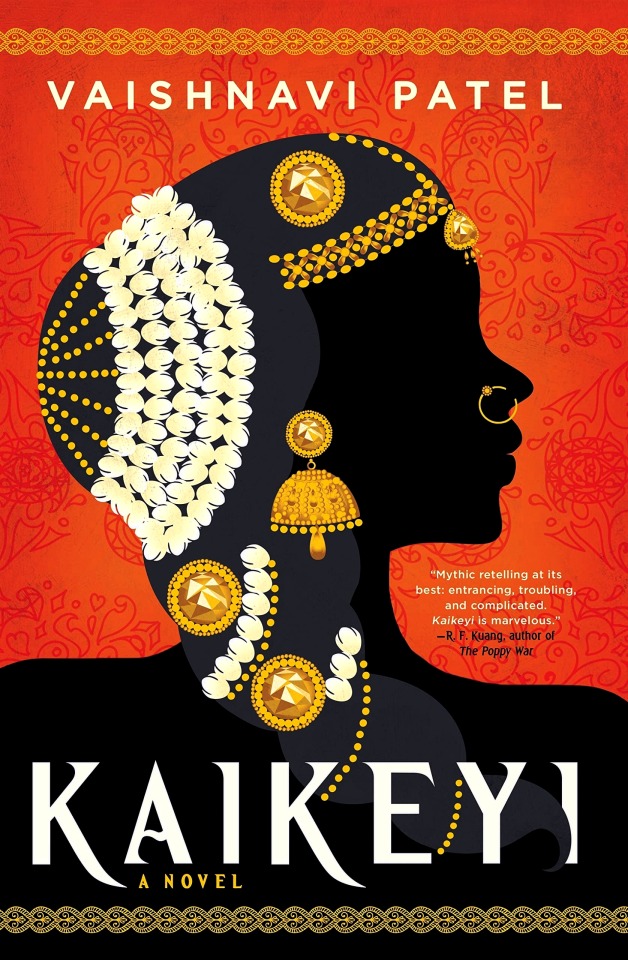
I ended up giving this book a 3/5 star rating based on just a craft perspective but as soon as I finished reading I ended up looking at reviews by Hindus online and well. Let's discuss below the cut.
So Kaikeyi is a retelling of the Ramayana from the perspective of Queen Kaikeyi. The Ramayana is a very important text in Hinduism and thus, assuming that Patel grew up in a Hindu household, one would expect her to be familiar with it in the same way I, as someone who grew up in a Catholic household, am familiar with the Bible.
Before I get into all of that, I would like to actually talk about the content of the book, since I am the target audience as an outsider to Hinduism looking to learn more about the stories that make up its foundations. I don't know anything about the Ramayana and I found this retelling to be very off, at least from a historical perspective.
One of the biggest issues I have with historical books is that authors really love to put their modern, 21st century views and ideals onto the narrative. It happens on all sides of the political spectrum and as a historian it makes me want to tear my hair out. I know it's unavoidable that our own perspectives shape how we write, but I wish that more people would take a step back and see how their ideas of feminism, in this case anyway, would actually have looked in the time period their book is set in.
Kaikeyi is the third wife of Dasharath and gives birth to his second son, Bharata, whom has been promised upon their wedding to ascend the throne. Kaushalya, Dasharath's first wife, also gave birth to his first son, Rama, of whom the Ramayana is actually focused on. However, while their children are growing up, we get a lot lot lot of the pushing of 21st century ideals in a historical setting. Kaikeyi is very invested in the ideas of women's rights which is fine? I guess? But it is very very hard for me to believe a woman of her standing, quite literally as the Queen of her nation, would be so class conscious and care this much about the average woman in her country without much reason.
Every single time Kaikeyi devolves into a rant about the Patriarchy and Feminism, it feels like this book would have been better suited to a modern retelling of the Ramayana rather than a historical one, though I can imagine it would still come with a lot of the same baggage re: an apparent lack of understanding of anything in the original Epic. The whole thing feels forced and like if Kaikeyi doesn't care about all women then she can't be a feminist character or reclamation or a "girl's girl" as the kids on tiktok are saying these days I think. Honestly I'd rather have a meaningful examination of her biases that are certain to actually be there if she were written to be like a person rather than a perfect ideal of Patel's feminism.
The first 2/3 of the book also felt like everything was just handed to Kaikeyi on a silver platter with very minimal pushback which just made her such an unbearable character to be in the headspace of for that period. I feel a lot of that space could have just been used better to show her stubbornness in the face of adversity that shines towards the end of the novel rather than just. Letting her passively have all of her goals handed to her with very minimal work on her part.
As a reading experience, the last 150 or so pages were probably the best to read as Kaikeyi's actions finally have real, tangible consequences for her but this is also the point where I saw a lot of Hindu readers had such an issue with this retelling of the Ramayana. Rama being portrayed as a misogynistic, war hungry prince and the erasure of Ravana's history of raping and kidnapping women were the two biggest points of contention for Hindu reviewers. I don't see why either of these changes were necessary to adapt this story for a modern, Western audience. By doing this, I believe Patel, intentionally or not, is playing into colonialist narratives about Hinduism rather than fighting them. It's also a disservice to present the Ramayana this way to both Hindu and non-Hindu readers, given that Hindus will be able to spot all the changes and disregard them, and non-Hindus are none the wiser to all the liberties Patel took with her retelling and are bound to spout them as fact if they don't look into the original.
I'd probably skip this book unless you're really into hashtag girlboss feminism retellings of fairy tales and myths, since so many of them miss the point of the original story. I can see the potential here for Patel as an author and am on the fence about trying her book coming out next month as the writing itself wasn't awful, but I'm not sure if I trust her with another myth retelling. At the very least, I suppose I can thank Patel for making me interested in reading the Ramayana at some point in the near future, so this review might have an update eventually.
#shay speaks#book reviews#bookblr#booklr#kaikeyi#i read this in like 3 weeks i'm kinda shocked#the prose reads very easily but its very insufferable to be in kaikeyi's head sometimes#i do want to take this book in good faith in that patel didnt mean for it to come across like this but.#also someone on goodreads said it felt more like reading a medieval european fantasy instead of something set in india....#god yeah it felt like that it was very. untethered to its setting.#anyway i'm tired and hungry i'm going to maybe eat in a bit here.
2 notes
·
View notes
Text
about to give the red white and roy*l blue movie a spin even though I was like the only person in my friend group who did not adore the book aha this'll be interesting
#idk the book was cute but the political implications that the author kept hinting at while not actually following up drove me NUTSSSS#like sorry if you're gonna do a royal romance that's really hard to do while being Socially Minded about it lol#like you can't have the queen make a joke about stealing a vase from india unless you follow that up with the characters like#actually doing something to make amends for colonialism!! but no they just joke about Oh Monarchy Bad and then go about their business ahah#I kept telling people that the author either needed to fully commit to a deconstruction of the political power systems#or needed to stop throwing out quirky one-liners about it before going right back to the romance haha#like either Do The Political Work (in the novel) or leave it out of the novel you know? you can't do both!#or at least. I did not think that book did both#that being said the romance was cute so I'm curious abt the movie. have heard mixed reviews.
12 notes
·
View notes
Text
Howls Moving Castle and The Princess Diaries Collide
This novel had me grinning from ear to ear and I haven’t felt this way about a book in a long time. The Wisteria Society of Lady Scoundrels by India Holton is an absolute gem of a find and I am so glad I picked it up because it is hilarious. Flying houses captained by high society pirate women, said women sending assassins to try and kill others who have been inconveniences and then taking tea…
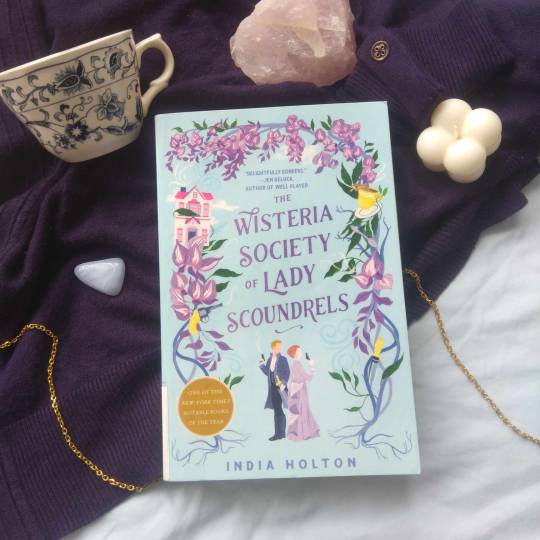
View On WordPress
#book review#Historical Fiction#historical fiction adventure#historical fiction series#historical romance#india holton#NZ author#romance#romance fiction#romcom#the wisteria society of lady scoundrels
4 notes
·
View notes
Note
favourite books, or favourite books from this year?
This is too difficult to narrow down to one or two, so here's a top five? (As of the start of September, because this has been sitting in my drafts for a WHILE)
In no particular order
Circe, by Madeline Miller - in terms of prose, Miller might literally be my favorite author writing today. She needs to have written more, please. Just perfectly beautiful and tragic and properly mythic and altogether sublime. Lodged in my head as the canonical telling of the myth of Circe to compare others to.
Downbelow Station, by C. J. Cherryh - I've rambled on about this at length already, but this is the rare piece of SFF that really feels plausible to me? Like, not in the sense of technology, but that there's no main character, that chance and contingency and weight of history matter more than the grand destiny of any individual or family, that the world is fundamentally amoral without being fundamentally malevolent, and just, it reads like it could be the history of the future. That's a really rare accomplishment. Also for what a cultural wasteland the 80s are supposed to have been it really didn't feel dated at all. (I've got two other Cherryh books that have been sitting on my dresser for six months I should really get to)
The Emperor of All Maladies: A Biography of Cancer, by Siddhartha Mukherjee - The acknowledgements for this book mention it was inspired by The Making of the Atomic Bomb, and you can tell (in the best possible way). One of the rare pop-sci books that really feels like it expands you understanding of the world and lifts some small few of the scales from your eyes. Also oddly hopeful and inspiring, for all the horrors (the very, very well-described horrors. I went form barely knowing what leukemia was to having nightmares about it).
Radiance, by Catherynne Valente - I do adore Valente's writing, but this is probably the first full length work of hers I've read that lives up to the novellas and short stories. It coasts by almost entirely on style and aesthetic and how perfectly aimed the character and arc of the protagonist is at me in particular, but my god the style and aesthetic are worth the price of admission. The whole thing should really fall apart under the weight of its pretension, and I really love it for the fact that it doesn't.
India in the Persianate Age, by Richard M. Eaton - A rather dry history text, really, and not one I'd really recommend to someone who just asked me for a book to read. But I've got at least a vague view-from-ten-thousand-feet idea of the shape of history from the medieval era on, and India was (and to a lesser extent is) one of the main remaining gaps. So I'm deeply appreciative for providing an organizing narrative of the region's development to use. And just generally, one of those books that really feels like its filling in little blank spots on the map? Sure it's dry, but just incredibly interesting subject matter and well-argued thesis.
(Honorable Mentions: The Chosen and the Beautiful by Nghi Vo, The Causal Angel by Hannu Rajaniemi, The Jasmine Throne by Tasha Suri)
#anon#book review#India in the Persianate Age#Richard M. Eaton#Radiance#Catherynne Valente#The Emperor of All Maladies#Siddhartha Mukherjee#Downbelow Station#C.J. Cherryh#Circe#Madeline Miller
39 notes
·
View notes
Text
October 2023 Recap
The WP map shows my hits have come from 22 countries around the world with bulk from Canada & the USA. Happy to see that Kenya & Mauritius are stilling having inching up to the top. Most popular posts was last month’s recap! The Stratford 2013 season recap proved popular as well with the Wednesday poetry chats doing nicely. City of Valleys up to 43 sections, about 87,000 words posted so far…
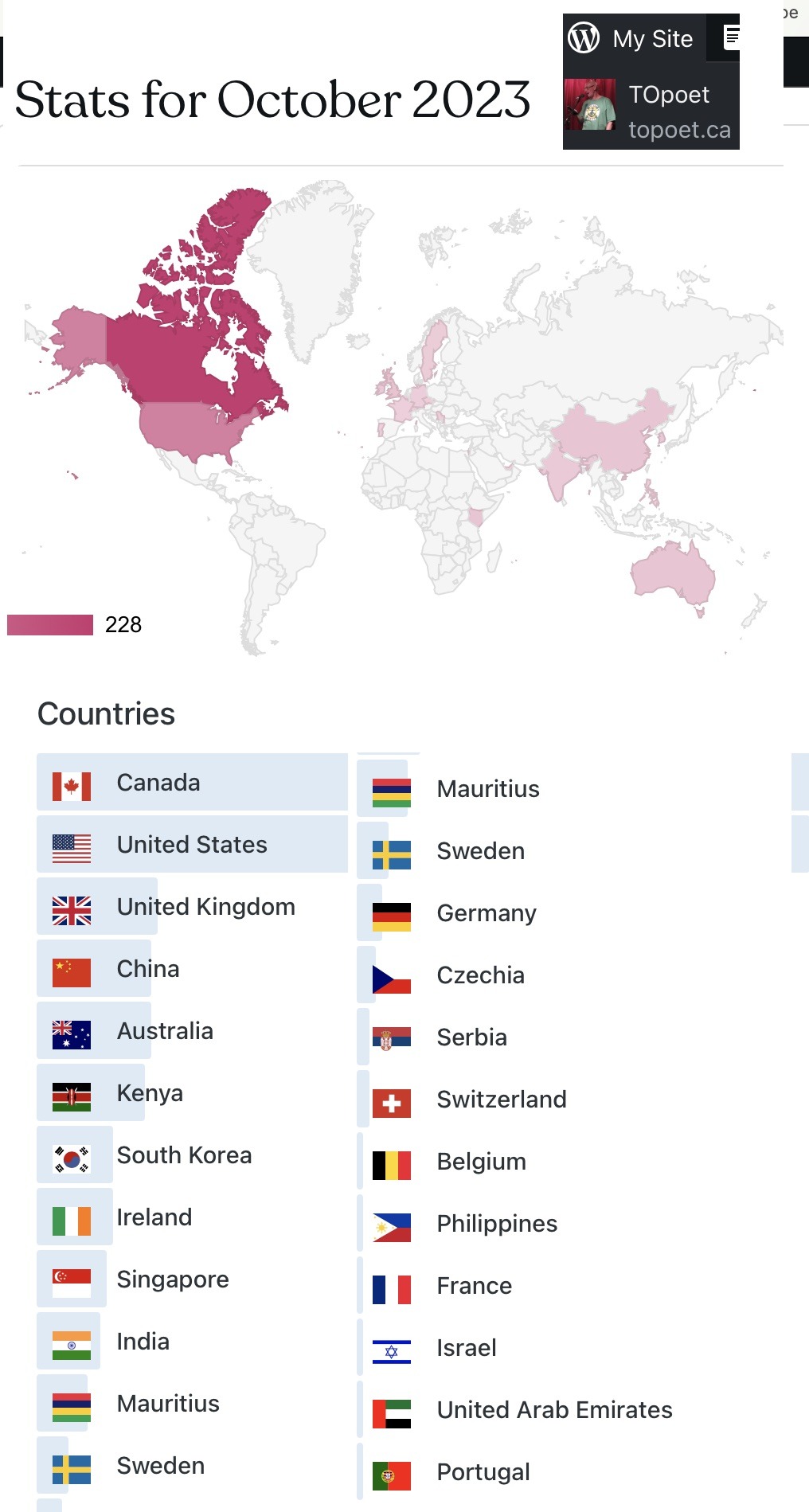
View On WordPress
3 notes
·
View notes
Text
Wellington: The Path to Victory 1769-1814 by Rory Muir
The general orthodoxy, when deciding who should take the laurel of the best general in British history, is that the main candidates are the Duke of Marlborough or the Duke of Wellington. There is good reason for their high esteem - both won great victories against the French on the field, and certainly they won a respect from their continental allies that was never quite equalled. Personally, I could go either way regarding them - I need to read a little bit more on Marlborough before I can make a truly confident judgement of his abilities - but if you forced me to pick one, I would say Wellington, and I don’t think I could find a better source than Rory Muir’s book to explain why.
Wellington: The Path to Victory is a thumping big book, and it’s only the first volume in Muir’s two-book biography, yet I’m hard-pressed to say there’s anything in it that’s superfluous. Muir paints a vivid picture of Wellington and the world in which he lived, from his youth in London and Dublin, through his early campaigns in India and his first time in the halls of power in Westminster to the challenges of his campaigns in Iberia. This is not simply a book about Wellington the general, as the story of Wellington the politician is demonstrated to be intertwined with his military career; this is as much a story of political patronage, political manoeuvre and political scheming as it is about cannon and swords.
Muir makes an excellent case for Wellington as a great general, although he does not shy away from criticism when it is deserved. His depiction of Wellington the man is deeply fair - Wellington was a proud man, often reluctant to delegate when he probably ought to have done so, sometimes sharp in tongue to the point of cruelty, and sometimes capable of great kindness. Wellington differs from, say, Nelson in that he was trusted but not necessarily loved, and that he did not seek to cultivate love in the same way Nelson did.
The war in the Peninsula was an allied affair, and readers will be pleased to note that the vital role played by the Portuguese (and later the Spanish) in Wellington’s army is emphasised. Indeed, I found reading about Wellington’s efforts to maintain the alliances with Portugal and Spain to be particularly interesting, as I had read very little about this previously.
I admit I’m struggling to say much about this one, except that it is very good and I recommend it, and that I don’t really have any problem with its theses. It is a thick book and therefore an undertaking, but it is worth all the time the reader puts into it. I thoroughly enjoyed my time with Wellington, and would recommend it be your first stop in any research about the life of Arthur Wellesley.
#book review#duke of wellington#rory muir#history#napoleonic wars#peninsular war#british army#spain#portugal#india
8 notes
·
View notes
Text
MY OCTOBER & NOVEMBER WRAP-UP
MY OCTOBER & NOVEMBER WRAP-UP
Hey everyone! Hope you are all doing good. Today’s video is going to be the October and November wrap-up. I managed to read 4 books in October and 5 books in November. My plans did change and so I had to make small adjustments. Here are my thoughts on all the books I read.
How was your reading month? Did you guys manage to read according to your plans and what were your highlights? Let me know…

View On WordPress
#book blog#Book Blogger#Book Blogger UAE#Book Recommendation#Book Reviewer India#Fazila Reads#Monthly wrap-up#Monthly Wrap-ups#November 2022 wrap-up#November reading wrap-up#October reading wrap-up#Youtube Video
3 notes
·
View notes
Text
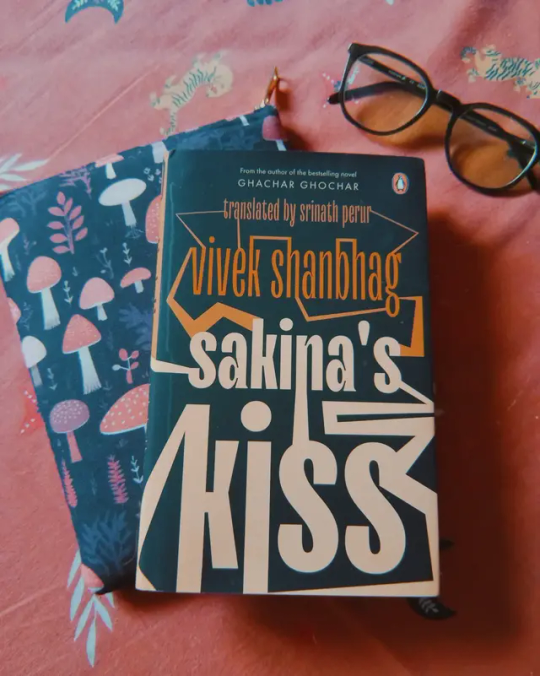
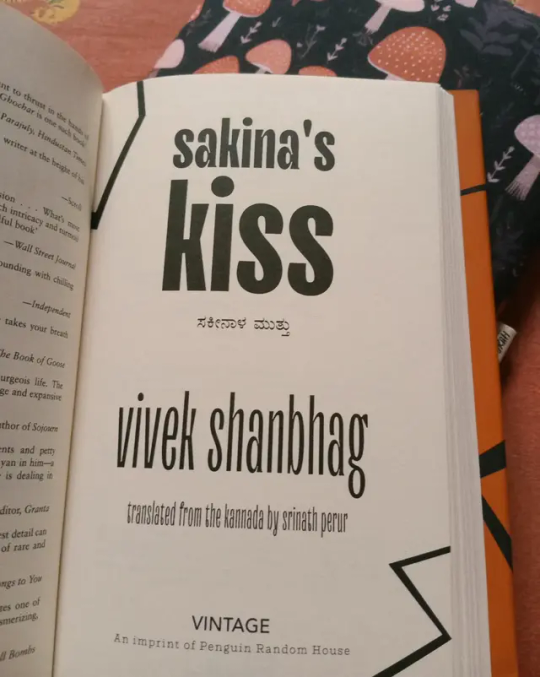

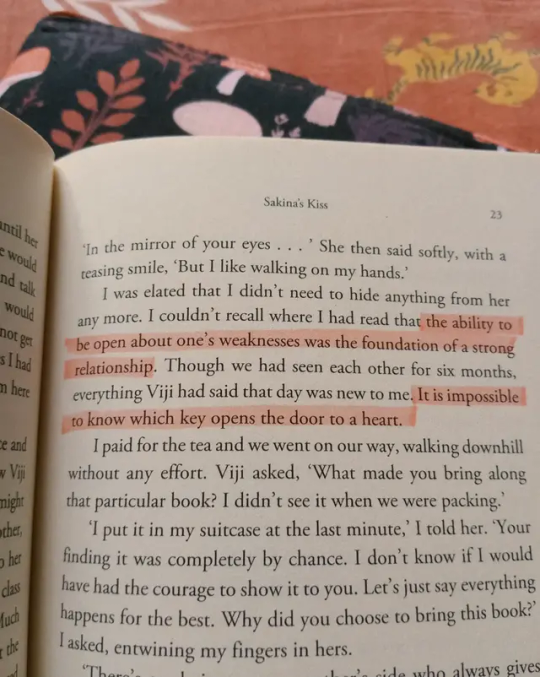
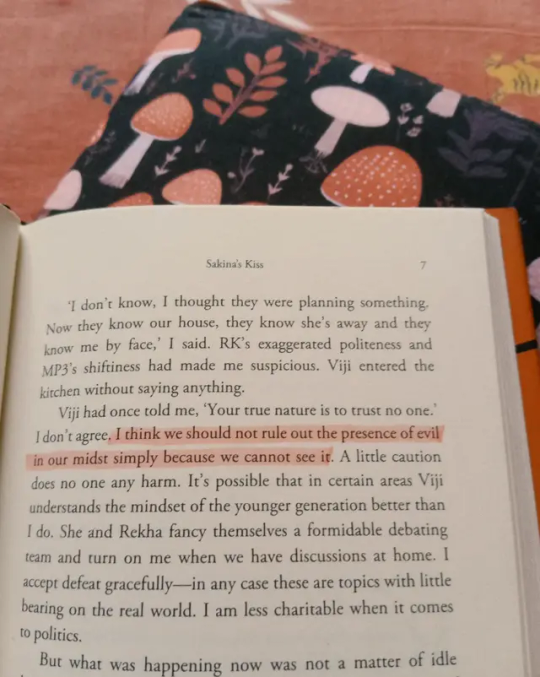
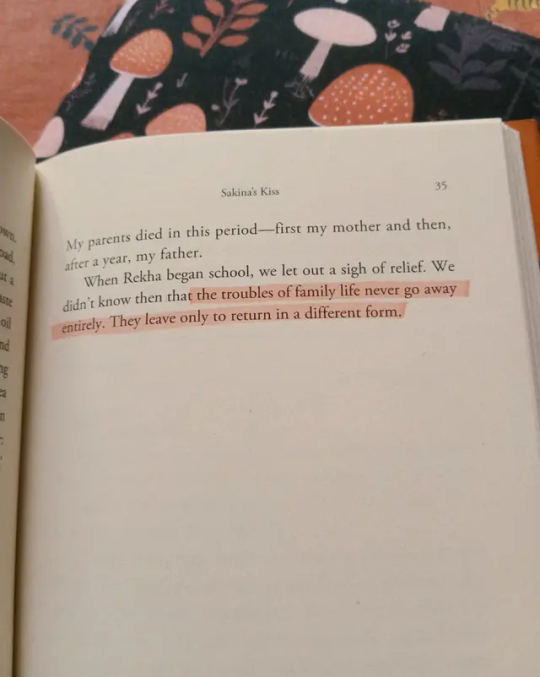
A book I read and loved recently.
Sakina's Kiss by Vivek Shanbag.
Translated by Srinath Perur.
Quite brilliant.
#india#mumbai#reading#bookworm#indian books#indian literature#literature#translation#fiction#book review#quotes#annotations
3 notes
·
View notes
Text
The Peshawar Lancers has some of the best world building I’ve seen in any alternate history novel. This is my review.

There are plenty of books I want to listen to, but they just aren't available in audio form. It frustrating, but it is what it is. Sometimes, however, my patience is rewarded in a big way. Case in point, The Peshawar Lancers by S.M. Stirling.
The Peshawar Lancers by SM Stirling is set in a world where Earth was struck by a series of asteroids in 1878. It wasn’t enough to wipe-out humanity, but it did screw up the climate. For example, it lead to five years of non-stop winter. As such, the various Europeans empires evacuated to their colonies in the southern hemisphere. For the British Empire this meant South Africa, Australia, and especially India. By 2020, the climate has stabilized, but the world is forever changed. The world is stuck in the Victorian era, but with some slight steampunk elements. More importantly, the British Empire, now called the Angrezi Raj, is home to an Anglo-Indian hybrid culture. The story follows a wide verity of characters, including the titular Peshawar Lancers, the Raj’s first line of defense on the frontier.
Interesting that Peshawar is where the Lancers are based. In ancient times, it was part of the Bactrian Kingdoms, a place of great culture exchange between Greeks and Indians. In fact, many of these Greek Indians eventually converted to Hinduism and Buddhism, eventually lead to a very unique culture and art style. I’m very tempted to thing that this was deliberate on Stirling’s part.
There are airships, Babbage Engines, and a couple steam-powered cars, but not really anything too fantastical in terms of technology. This is explains somewhat in-universe. Humanity had to focus on rebuilding after The Fall, so that stunted technological progress. Moreover, India doesn’t have access to a lot of mineral fuels, and there isn’t much need when wood is so plentiful. It is mentioned that steamships only recently surpassed wooden sailing ships in terms of capabilities.
Like I said, I utterly adore the world building that went into this novel. There’s even an index at the end containing certain details that didn’t make it into the novel proper. I loved the Anglo-Indian hybrid cultures of the Raj, France-outre-Mer in North Africa (which actually retained its French culture), andd the balls to walls insanity of how Russia is now an empire of Satanic cannibals.
The writing is also quite good. It reminds me very much of Victorian adventure novels by people such as H. Rider Haggard and Rudyard Kipling. I went on a kick of those in many younger days, so I was all onboard for that aspect.
Stirling has stated that he very much would like to write a sequel, but the sales weren’t good enough for his publisher to greenlight one. Oh well, I guess we can always hope that one day a sequel will come. Also, the man himself was nice enough to personally leave a comment on my blog saying that he appreciates my review.
The audiobook version is, of course, the whole reason we're having this review. It is narrated by Shaun Grindell, who perfectly captures the story. I'm very happy that this amazing work of alternate history is available in audiobook form at long last.
Have you read The Peshawar Lancers? If so, what did you think?
Link to the full review on my blog is here: https://drakoniandgriffalco.blogspot.com/2018/09/book-review-peshawar-lancers-by-sm.html?m=1
#alternate history#The Peshawar Lancers#S.M. Stirling#book review#book recommendations#audiobook review#British Empire#India#British Raj#book#books#audiobook#audiobooks#post apocalyptic#Alien Space Bats#ASB#Adventure#science fiction#scifi#Science Fiction Books#adventure books#Steampunk#alt history#steampunk books#steampunk fiction
3 notes
·
View notes
Text
“One ought,every day at least,to hear a little song,read a good poem,see a fine picture,and, if it were possible,to speak a few reasonable words.”
Goethe
View On WordPress
#Asha Seth#best indian book blogs#book review blogs#book review blogs india#Book Reviews#missbookthief#Poetry#top indian authors#top indian bloggers#top indian blogs on wordpress
4 notes
·
View notes
Text
July Reads 🤍

#academia#literature#books#bookstagram#book review#bookish#book blog#numerology#science and spirituality#body mind spirit#virginia woolf#bookworm#july 2023#monthly#oshobooks#osho#india
5 notes
·
View notes
Text
Rain like this doesn’t wash away the filth: Hawa Hawa and Other Stories by Nabarun Bhattacharya
Rain like this doesn’t wash away the filth: Hawa Hawa and Other Stories by Nabarun Bhattacharya, translated by Subha Prasad Sanyal @seagullbooks
The gleaming wet road, the rusty tin roof of a motorcar repair garage, behind it an old paint-peeling stunned-still old house and a chimney precariously propped up with haphazard wires—the sky can see all this. And, not as clearly, the burnt-black tin-backed shops and buses and the in-between blocks of darkness that were Matador sheds and not the half-rotten bellies of fish but the shells of…
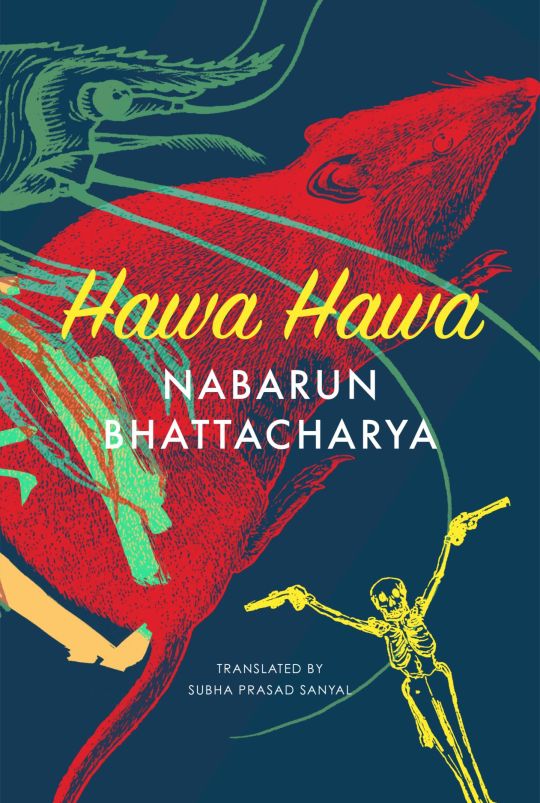
View On WordPress
#Bengali#book review#books#Hawa Hawa and Other Stories#India#literature#Nabarun Bhattacharya#Seagull Books#short stories#Subha Prasad Sanyal#translation
4 notes
·
View notes
Text
I’ve been wanting to try something for a while. A book club. Unfortunately, I haven’t been able to find anyone who is interested in joining me, so I figured I would use this as my own sort of book club, or at least somewhere to jot down my thoughts and track what I’ve been reading.
I’ve recently finished The Wisteria Society of Lady Scoundrels by India Holtob and was absolutely in love with the book. For September I will be reading the second book in the series, The League of Gentlewomen Witches.

The book is 325 pages, 26 chapters. Since I’m slowly getting back into reading, I figured I would split the chapters up over the course of four weeks which would be 6.5 chapters a week, about a chapter a day.
Feel free in joining me as I read. I plan to post my thoughts once a week starting a week from the first of the month. ☺️

#booktok#bookclub#india holton#the wisteria society of lady scoundrels#the league of gentlewoman witches#reading#bookblr#book review
9 notes
·
View notes